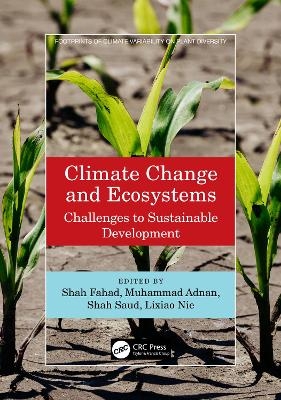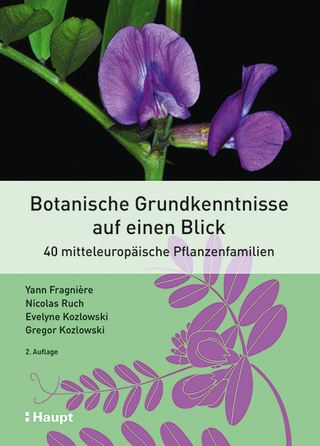
Climate Change and Ecosystems
CRC Press (Verlag)
978-1-032-26068-6 (ISBN)
Features:
This book brings together a multidimensional group of international scholars exploring the ethical dimensions of climate change and ecosystem.
New strategies have been pointed out in this book for better sustainable development.
This book has been designed to provide a good overview of major challenges facing policymakers, researchers, and ultimately humankind in dealing with climate change.
This book summarizes the diverse features of vulnerability, adaptation, and amelioration of climate change in respect to plants, crops, soil, and microbes for the sustainability of the agricultural sector, and, ultimately, food security for the future.
This book provides a state-of-the-art description of the physiological, biochemical, and molecular status of the understanding of abiotic stress in plants.
Dr. Shah Fahad is a Professor in the Hainan Key Laboratory for Sustainable Utilization of Tropical Bioresource, College of Tropical Crops, Hainan University, Haikou, China. He obtained his PhD in Agronomy from Huazhong Agriculture University, China, in 2015. After doing his postdoctoral research in Agronomy at the Huazhong Agriculture University (2015–17), he accepted the position of Assistant Professor at the University of Haripur. He has published over 332 peer-reviewed papers (Impact factor 1050.18) with more than 300 research and 32 review articles, on important aspects of climate change, plant physiology and breeding, plant nutrition, plant stress responses and tolerance mechanisms, and exogenous chemical priming-induced abiotic stress tolerance. He has also contributed 58 book chapters to various book editions published by Springer, Wiley-Blackwell, and Elsevier. He has edited seventeen book volumes, including this one, published by CRC press, Springer, and Intech Open. He won Young Rice International Scientist award, Distinguish scholar award ,Top young investigator award, Dr Shah Jahan Agriculture award (PAS) in 2014, 2015, 2019 and 2021 respectively. He won 15 projects from international and national donor agencies. Dr. Shah Fahad name figured twice among the top two percent scientists in a global list compiled by the Stanford University, USA. Dr Shah Fahad name is also included in the distinguish list of 2021, Higly Cited Researchers announced by the Clarivate/Web of Sciences. He has worked and is presently continuing on a wide range of topics, including climate change, greenhouse emission gasses, abiotic stresses tolerance, roles of phytohormones and their interactions in abiotic stress responses, heavy metals, regulation of nutrient transport processes. Dr. Muhammad Adnan is a lecturer in the Department of Agriculture at the University of Swabi (UOS), Pakistan. He has completed his PhD (soil fertility and microbiology) from the Department of Soil and Environmental Sciences (SES) the University of Agriculture Peshawar, Pakistan and Department of Plant, Soil and Microbial Sciences, Michigan State University, USA. He has received his MSc and BSc (Hons) in Soil and Environmental Sciences, from Department of SES the University of Agriculture, Peshawar-Pakistan. Dr. Shah Saud is currently working as an Assistant Professor in the College of Life Science, Linyi University, Linyi, China. He received his Ph.D. in Turf grasses (Horticulture) from Northeast Agricultural University, Harbin, China. He is currently working as a Post Doctorate researcher in department of Horticulture, Northeast Agricultural University, and Harbin, China. Dr. Shah Saud has published over 160 research publications in peer-reviewed journals. He has edited five books and written 35 book chapters on important aspects of plant physiology, plant stress responses, and environmental problems in relation to agricultural plants. According to Scopus®, Dr. Shah Saud’s publications have received roughly 3000 citations with an h-index of 34. Dr. Lixiao Nie, Professor, Ph.D. supervisor, Crop Cultivation and Farming System, College of Tropical Crops, Hainan University, Haikou, China. He received Ph.D. degree in Crop Cultivation and Farming System from Huazhong Agricultural University, China in 2008. In 2005-2007, He conducted his Ph.D. thesis research at the Philippines-based International Rice Research Institute (IRRI) under the supervision of Drs. Shaobing Peng and Bas Bouman. He then joined Huazhong Agricultural University and worked as a Crop Physiologist from 2008 to 2019. From 2019, he moved to Hainan University. His research mainly focuses on crop simplified and green planting and cultivation. He teaches courses related to plant physiology, and crop cultivation and has published more than 90 papers/chapters in international journals and books. His H-index and RG score are 28 and 35.83, respectively. He served as Editorial Board Member for international journals, Field Crops Research (2018-now) and Scientific Reports (2015-now), and Deputy editor in chief for a Chinese national journal (2020-now). He received "leading talents" and "one thousand talents project" from Hainan Province, China in 2020. In recent years, he presided over four NSFC projects and two National key R & D projects.
1. Microbial Flora of Marble Waste Polluted Environment in the Phylogenetic Perspectives. 2. Interaction of Environment and Entomology. 3. Climate Change, Insects and Global Food Production. 4. Extreme High Temperature and Plant Life. 5. Molecular and Physiological Mechanism of Native Plants to Combat Drought Stress Under Changing Climatic Conditions. 6. Climate Change Oriented Elevated Carbon Dioxide: Implications on Plant Physiology and Global Food Security. 7. Effect of Environmental Pollution on Plant Growth. 8. Phyto-Ecological Studies of Genus Phoenix (Linn.), (Dates palms) from Various Zones of Pakistan. 9. Soil Biodiversity in Changing Climate. 10. Biochar Magic Against of Abiotic Stresses. 11. Biomolecular Intervention in Understanding Plant Adaptation to Climate Change. 12. Halophytes Diversity as an Indicator to Saline Environment in Pakistan. 13. Bacterial Contamination in Food Chain; Sources, Impact and Control. 14. Molecular and Ecological Mechanisms of Grasshopper Food Selection and Habitat Adaptation. 15. Climate Change: A Global Perspective. 16. Pollinators Ecology and Management.
| Erscheinungsdatum | 06.07.2022 |
|---|---|
| Reihe/Serie | Footprints of Climate Variability on Plant Diversity |
| Zusatzinfo | 8 Tables, black and white; 20 Line drawings, color; 15 Halftones, color; 35 Illustrations, color |
| Verlagsort | London |
| Sprache | englisch |
| Maße | 178 x 254 mm |
| Gewicht | 453 g |
| Themenwelt | Naturwissenschaften ► Biologie ► Botanik |
| Weitere Fachgebiete ► Land- / Forstwirtschaft / Fischerei | |
| ISBN-10 | 1-032-26068-8 / 1032260688 |
| ISBN-13 | 978-1-032-26068-6 / 9781032260686 |
| Zustand | Neuware |
| Informationen gemäß Produktsicherheitsverordnung (GPSR) | |
| Haben Sie eine Frage zum Produkt? |
aus dem Bereich


